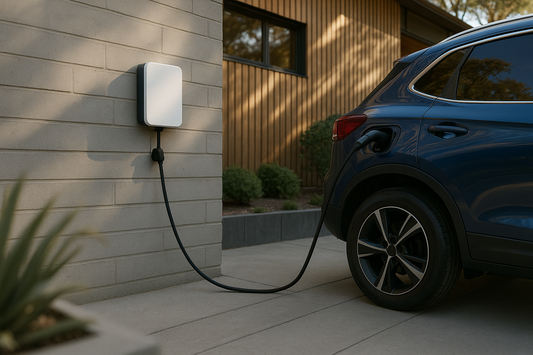The merging of intelligence (AI) and electric vehicles (EVs) goes beyond a passing trend—its shaping a chapter, in automotive innovation. From enhancing vehicle performance and safety to impacting charging networks and maintenance practices AI is transforming not how we drive but our perspectives on sustainability and the future of transportation.
This in depth conversation delves into the influence of AI on the EV sector. Than glimpsing into tomorrow this article serves as a detailed guide to the intricate and thrilling advancements happening today and their implications for what lies ahead.
AI Driving Innovation in Electric Vehicles

Artificial Intelligence (AI) stands at the forefront of revolutionizing the vehicle (EV) realm pushing boundaries in performance, safety and sustainability. This significant blend of technologies marks a phase in progress, where AIs analytical capabilities elevate every aspect of the EV journey. From ensuring safer driving to optimizing energy consumption and reshaping vehicle upkeep.
Empowering EVs through AI
The integration of AI into vehicles leads to enhancements in functionality and safety. With their infrastructure EVs naturally lend themselves to AI integration enabling real time adjustments, to driving dynamics, energy optimization and proactive maintenance.
The collaboration, between vehicle (EV) technology and artificial intelligence (AI) not simplifies operating vehicles but also opens up possibilities for advanced autonomous driving capabilities.
Electric vehicles with their power systems and advanced electronic components provide a foundation for leveraging the potential of AI. This synergy allows for battery management enhanced energy efficiency. Upgraded safety features all contributing to a more dependable and sustainable transportation solution. Through the integration of AI electric vehicles are transforming into safer and efficient modes of transportation representing a significant advancement in the pursuit of environmentally friendly mobility.
Optimizing Performance with AI
One area where AI is revolutionizing EVs is in enhancing performance. AI algorithms are now integrated into EV power systems to regulate energy distribution effectively adjusting the balance between battery life and driving range. These systems are not just theoretical; they can adapt to drivers behaviors and road conditions to ensure each journey is optimized for efficiency while maximizing the batterys lifespan.
Ensuring Safety for Drivers and Passengers
AIs impact, on vehicle safety is exceptionally significant.
Advanced driver assistance systems (ADAS) are using AI technology to enhance safety on the road by incorporating features such, as emergency braking (AEB) adaptive cruise control and lane keeping assistance which are now becoming standard in electric vehicles (EVs). AI is also advancing in detecting signs of driver fatigue a crucial safety issue often overlooked, by monitoring expressions and steering behaviors to prompt drivers to take a rest when needed.
AI's Role in the Progress of EV Charging Infrastructure

The expansion of the electric vehicle market has emphasized the necessity for an flexible charging network. AI has emerged as a facilitator in achieving this goal simplifying the charging process for users and optimizing energy usage for providers.
The Future of Intelligent Charging Stations
AI's capacity to analyze data sets holds promise for enhancing the functionality of charging stations. Through studying user charging habits and local resource availability AI can streamline the charging procedure for efficiency and user convenience. Predictive algorithms can also anticipate usage trends enabling operators to prepare for peak demand periods and potentially prevent strain on the power grid.
Adaptive Pricing. Energy Management
In a changing energy environment AI can help strike a balance, between cost effectiveness and environmental sustainability.Implementing flexible pricing strategies, at charging stations can encourage users to charge their vehicles during off peak hours, which helps reduce strain on the power grid and offers cost savings. Additionally advanced energy management systems powered by AI ensure distribution of power among all charging stations maintaining efficiency while minimizing costs for operators.
Collaborative Innovations: The Case of Honda and Nissan

In the realm of innovation the partnership between standing competitors Honda and Nissan exemplifies the importance of working together amidst technological advancements. Their joint venture into AI and electric vehicle technology development signifies a decision that holds advantages for both companies and the electric vehicle industry as a whole.
An Unexpected Alliance
The unexpected alliance between Honda and Nissan involves pooling resources and expertise in AI to drive research and development efforts in EV components and software. This cooperative approach not promises increased production efficiency. Also fosters technological advancements that enhance competitiveness in a rapidly changing market landscape.
Looking to the Future Together
Looking ahead the collaboration between Honda and Nissan signals a shift in industry dynamics towards innovation driven cooperation rather than traditional competition. It reflects a shared commitment to advancing technology, in an AI driven environment.
The collaboration spirit plays a role, in driving the vehicle (EV) industry forward helping it overcome challenges and seize opportunities presented by artificial intelligence.
Market Dynamics and Consumer Behavior

The integration of AI and EVs is causing changes in market dynamics and consumer behavior. Leading global companies like Tesla and Xpeng are setting the trend prompting manufacturers to adjust their strategies to stay competitive.
AIs Role as a Catalyst for Change
In an industry already undergoing transformations AI is acting as a catalyst for change. Manufacturers are leveraging AI to introduce product lines that anticipate market trends and consumer preferences fostering an agile and responsive marketplace.
Understanding and Adapting to Consumer Trends
The increasing presence of AI in EVs has ushered in a phase of consumer interaction through driving experiences and streamlined vehicle management applications. Forward thinking companies are harnessing AI to analyze datasets gaining insights into consumer behavior that can influence marketing strategies, product development and customer support.
AI's Impact on Predictive Maintenance and Fleet Operations

The integration of AI into EVs goes beyond the drivers experience with implications, for maintenance practices and fleet management. Predictive analytics is poised to revolutionize how these critical aspects of the industry are handled.
Preventing Issues Before They Occur
AI's maintenance capabilities can anticipate problems, in vehicles well in advance. By analyzing performance data these systems can recognize patterns that indicate malfunctions enabling maintenance to reduce downtime and avoid expensive repairs.
Efficient Fleet Management
The precision of fleet management has greatly improved with the help of AI. The technologys data processing and interpretation abilities enable optimal route planning, energy efficiency and effective resource allocation. It is expected that more electric vehicle fleets will adopt AI driven solutions to operate smoothly and provide services.
Challenges and Prospects of Integrating AI with Electric Vehicles
While the advantages of incorporating AI into the electric vehicle industry are evident there are obstacles that need to be overcome. These challenges include complexities, regulatory issues and societal impacts.
Addressing Technical Obstacles
Integrating AI into vehicles demands technology and a skilled workforce. Car manufacturers are investing in training and research to cultivate the expertise; however the industry, as a whole must adjust to a changing technological environment.
Navigating Regulatory Challenges
Regulations concerning AI in vehicles are still developing. Car manufacturers and policymakers need to collaborate to ensure that the advantages of AI are balanced, with regulations that safeguard consumers and prioritize safety.
Ethical and Social Considerations
The integration of AI in vehicles (EVs) brings up concerns especially regarding privacy and job displacement. The industry should engage in discussions with stakeholders to address these issues ensuring that AI adoption aligns with societal objectives.
Conclusion
AI is not a concept for the EV sector; it's a crucial aspect of the present and a clear path toward a sustainable, efficient and thrilling future. The examples and insights presented in this piece demonstrate how AI is revolutionizing all aspects of EVs from design and production to the driving experience and beyond.
As the automotive industry shifts towards electrification, challenges and opportunities arise, with AI playing a role in both. By embracing and leveraging the capabilities of AI, car manufacturers and technology enthusiasts can lead changes while creating a transportation ecosystem full of innovation.
The journey, towards tomorrows EV landscape may be filled with uncertainties. One thing remains certain; AI will be steering progress ahead.



